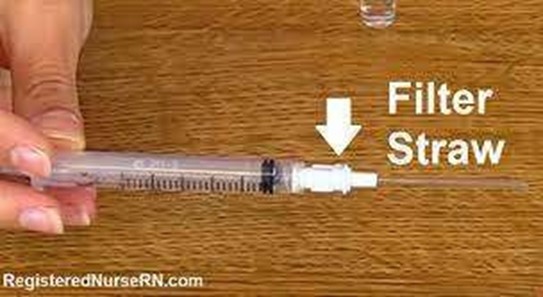A nurse is caring for a client who has an indwelling urinary catheter.
The nurse notes that sediment is present in the urine.
Which of the following actions should the nurse take to obtain a sterile urine specimen?
Unclamp the collection port below the bag.
Obtain the specimen from the retention port.
Disconnect the catheter from the collection tubing.
Use the balloon port to obtain the sterile specimen.
The Correct Answer is B
This is because the retention port is a sterile site that can be accessed by a syringe to aspirate urine without contaminating the specimen or the closed drainage system. The retention port should be cleaned with an alcohol swab before inserting the syringe. The specimen should be transferred to a sterile container and labeled appropriately.
Choice A is wrong because unclamping the collection port below the bag would allow urine to flow out of the bag, which is not sterile and may contain bacteria or sediment.
Choice C is wrong because disconnecting the catheter from the collection tubing would break the closed drainage system and increase the risk of infection.
Choice D is wrong because using the balloon port to obtain the sterile specimen would deflate the balloon that holds the catheter in place and cause trauma to the bladder wall.
Normal ranges for urine characteristics vary depending on the type of analysis, but some general parameters are:
• Color: pale yellow to amber
• Clarity: clear or slightly cloudy
• Odor: faint aromatic
• pH: 4.5 to 8.0
• Specific gravity: 1.005 to 1.030
• Protein: <150 mg/24 hr
• Glucose: negative
• Ketones: negative
• Blood: negative
• Nitrites: negative
• Leukocyte esterase: negative
• Bacteria: <10,000 CFU/mL
Nursing Test Bank
Naxlex Comprehensive Predictor Exams
Related Questions
Correct Answer is A
Explanation

This is because glass ampules can leave small shards of glass in the solution, which can be harmful if injected into the client. A filter needle has a small mesh that traps any glass particles and prevents them from entering the syringe.
Choice B is wrong because the nurse should break the neck of the ampule away from the body to avoid injury from the glass.
Choice C is wrong because the nurse should use a different needle to inject the client after withdrawing the medication with a filter needle. This is to prevent contamination and reduce pain for the client.
Choice D is wrong because the nurse should dispose of the ampule in a sharps container, not in the trash can. This is to prevent injury and infection from the broken glass.
Correct Answer is D
Explanation
This is because the child is at risk for developing peritonitis, which can cause severe abdominal pain. Scheduled analgesics can provide better pain relief than PRN analgesics.
Choice A is wrong because the child should not be given anything by mouth until bowel sounds return, which can take up to 24 hr after surgery.
Giving clear liquids too soon can cause nausea, vomiting, and abdominal distension.
Choice B is wrong because cromolyn nebulized solution is used to prevent asthma attacks, not to treat appendicitis.
There is no indication that the child has asthma or needs this medication.
Choice C is wrong because applying a warm compress to the operative site can increase inflammation and infection risk.
A cold compress can be used to reduce swelling and pain, but only if prescribed by the provider.
Whether you are a student looking to ace your exams or a practicing nurse seeking to enhance your expertise , our nursing education contents will empower you with the confidence and competence to make a difference in the lives of patients and become a respected leader in the healthcare field.
Visit Naxlex, invest in your future and unlock endless possibilities with our unparalleled nursing education contents today
Report Wrong Answer on the Current Question
Do you disagree with the answer? If yes, what is your expected answer? Explain.
Kindly be descriptive with the issue you are facing.
